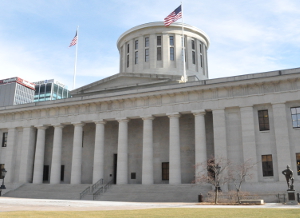Lame duck roundup: Stopgap unemployment comp fix on the table
OSCPA staff report

Legislators along with business and labor leaders on Tuesday unveiled a set of short-term concessions as they pledged to reach a full solvency plan for Ohio’s unemployment system by April 1.
That’s just one of the big stories from the Ohio Statehouse this week, as lawmakers continued a flurry of lame-duck action before adjourning sine die.
That announcement of the unemployment agreement came a day after House Bill 620, a substitute bill addressing unemployment compensation reforms, was unexpectedly withdrawn from hearings.
The State of Ohio on Aug. 30 paid off its unemployment compensation debt to the federal government after the spring passage of House Bill 390. But a long-term legislative remedy is still needed to avoid significant penalties that could be triggered by even a small recession.
Labor groups said HB 620 asked substantially more of labor than business. Tuesday’s compromise, which was drafted as an amendment to Senate Bill 235, includes repeal of penalties in HB390. It would also temporarily enact both a freeze on employee benefits and a $500 increase from $9,000 to $9,500 in employers’ taxable wage base for two years starting in 2018.
Further actuarial studies, paid for by business and labor, will be undertaken to decide how best to move forward with a longer-term fix. Rep. Kirk Schuring (R-Canton), said the idea of a “supplemental fund” for benefits could be one proposal the actuary evaluates.
The House approved the plan Thursday after adding it to the unrelated Senate Bill 235. The Senate concurred with changes to the bill late Thursday night.
Under the bill, which will become law if signed by the governor, starting in 2018 benefits paid to jobless workers would be frozen and the taxable wage base on which employers must pay unemployment taxes would increase from the first $9,000 of an employee's wages to $9,500. And a current law that automatically levies increased taxes on businesses if the state is forced to borrow from the federal government would be repealed.
OSCPA’s Ohio Tax Reform Task Force white paper recommended the legislature take steps to ensure the system’s solvency.
There has also been action on other bills of interest to CPAs:
HB 9
The bill, which is supported by OSCPA, would create a tax expenditure review committee to periodically review existing and proposed tax expenditures. It passed both houses this week after an unrelated amendment was removed, and it now goes to the governor's desk for his signature.< /p>
SB 288
As reported last week, SB 288, which reforms taxation of pass-through entities, unanimously was voted out of the Senate. As expected, the bill did not see House action this week, meaning it will need to be reintroduced next session. This highly complex legislation, spearheaded by OSCPA, has already seen much of the technical deliberations take place over the past year and is anticipated to move somewhat easily through the legislative process next year.
HB 384
The legislature passed a bill that would give the Auditor of State’s office the authority to conduct performance audits of Ohio’s institutions of higher education. OSCPA has long supported the idea, and this week sent proponent testimony to the Senate Finance Committee.
All activity for the two-year session is expected to conclude this week, leaving any unfinished legislation to expire at year end. Any approved bills still need the Governor’s signature to become law.
